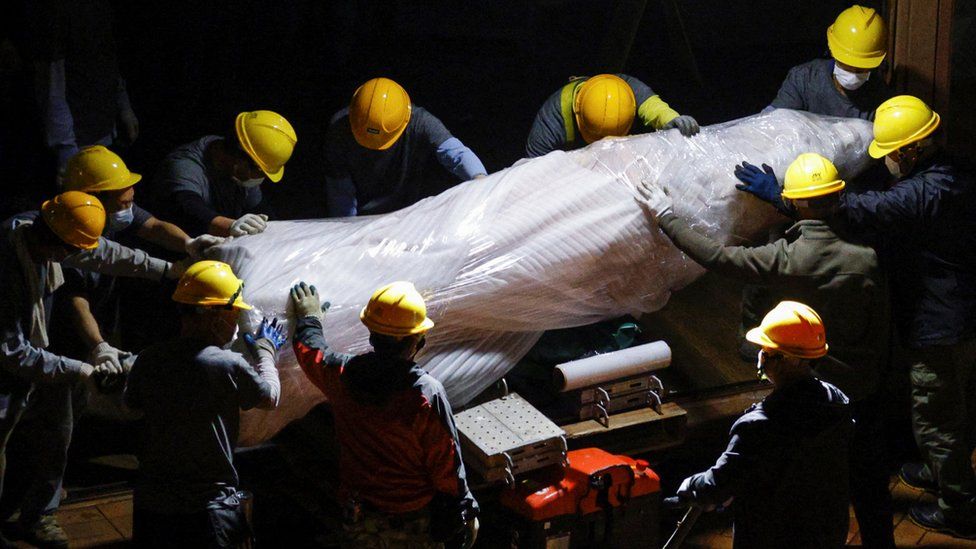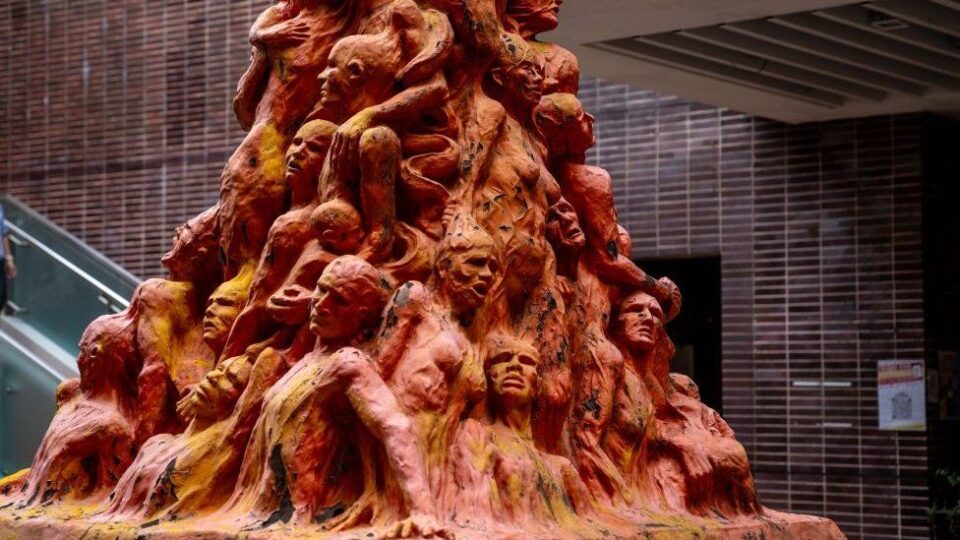A famous statue at the University of Hong Kong marking the Tiananmen Square massacre was removed late on Wednesday.
The statue showed piled-up corpses to commemorate pro-democracy protesters killed by Chinese authorities in 1989.
It was one of the few remaining public memorials in Hong Kong commemorating the incident, which is a highly sensitive topic in China.
Its removal comes as Beijing has increasingly been cracking down on political dissent in Hong Kong.
The city used to be one of few places in China that allowed public commemoration of the Tiananmen protests.
The university had initially ordered the removal of the statue – called the Pillar of Shame – in October.
“The decision on the aged statue was based on external legal advice and risk assessment for the best interest of the university,” it said in a statement on Thursday.
“The university is also very concerned about the potential safety issues resulting from the fragile statue.”
The first sign the statue was being taken down came late on Wednesday, when university officials fenced off the area with plastic sheeting.
Construction workers worked overnight behind plastic barriers to dismantle the 8m (26ft) copper statue. Security guards blocked reporters from approaching and tried to stop them from filming.
The BBC’s Grace Tsoi, who was at the scene, said there was sound of cracking and drilling, but no one could see what was happening.

Towering at 8 metres, the statue depicts a column of dozens of torn and twisted bodies with anguished faces, “to remind us of a shameful event which must never recur,” according to its sculptor Jens Galschiot.
The university said it would put the statue, which has been on display at the university’s campus for 24 years, into storage.
Mr Galschiot called the removal “really brutal” and that he would consider suing the authorities and demand compensation.
“This is a sculpture about dead people and [to] remember the dead people in Beijing in ’89. So when you destroy that in this way then it’s like going to a graveyard and destroying all the gravestones,” he told the BBC’s Newshour programme.
Why is its removal significant?
“[The statue] was one of the few remaining prominent, public memorials [of the] crackdown… and a reminder of Hong Kong’s freer past,” Dr Ian Chong, Associate Professor at the National University of Singapore, told the BBC.
“[Its removal] takes away yet another public focal point for commemorating of the massacre… [and] appears to signal that the Hong Kong and Beijing governments will no longer tolerate public displays of remembrance of the events surround June 4.”
The statue’s removal comes on the heels of a poorly-attended Hong Kong’s parliamentary election that saw pro-Beijing candidates sweep into power, the timing of which Dr Chong termed “symbolic.”
Beijing also introduced a strict national security law last year that criminalises secession, subversion, terrorism and collusion with foreign forces, which activists say is being used to suppress civil society, jail democracy campaigners and curb basic freedoms.
What were the Tiananmen Square protests?
Hundreds, possibly thousands, of peaceful pro-democracy demonstrators were killed by Chinese troops in Beijing’s Tiananmen Square in the summer of 1989.
International condemnation ensued after troops and tanks opened fire on protesters.
The incident is considered highly politically sensitive in the mainland and authorities ban even oblique references to the events of June 4.
In 2020, Hong Kong authorities banned the annual vigil commemorating Tiananmen for the first time in 30 years, citing Covid restrictions – though activists have accused local officials of bowing to pressure from Beijing to muzzle pro-democracy expression.
In October, nine pro-democracy Hong Kong activists were sentenced to between six and 10 months in prison for taking part in the vigil.
Earlier this month, media tycoon Jimmy Lai also received 13 months in prison for participating in the same vigil.




